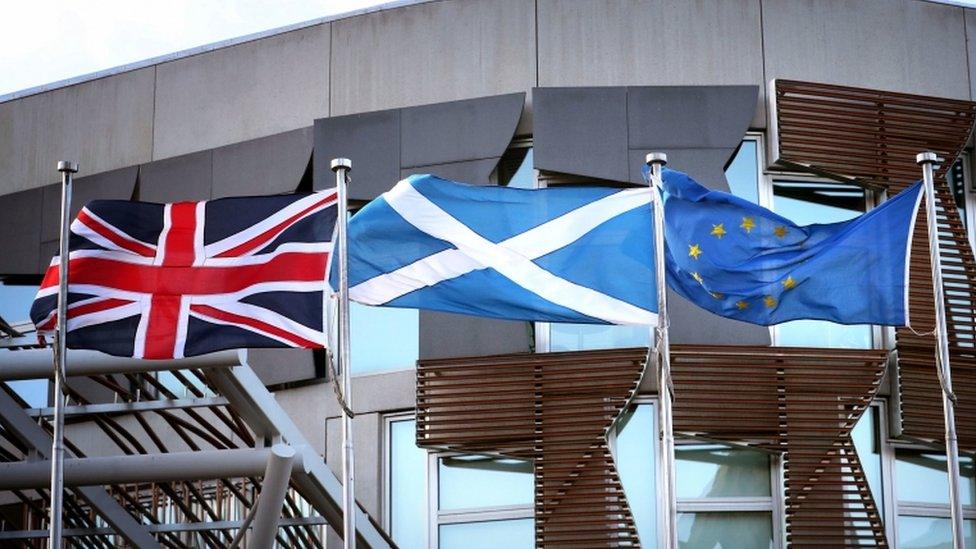Brexit transition extension 'essential' to protect Scottish economy
- Published
- comments

Billions of pounds could be wiped off Scotland's economy without an extension to the Brexit transition period, according to the Scottish government.
Economic modelling, external suggests GDP could be between £1.1bn and £1.8bn lower by 2022 (0.7% to 1.1%) without a delay.
The transition period, due to end on 31 December, can be extended by up to two years if agreed by the end of June.
The UK government has said it has no intention of doing so, and needs "flexibility" to deal with coronavirus.
While the UK left the EU on 31 January the transition period left most arrangements in place - including Britain's membership of the customs union and single market - until the end of the year while a trade deal was negotiated.
A fourth round of talks has begun but there is little sign of any breakthrough with both sides sticking to their positions.
The Scottish government said the coronavirus pandemic and left businesses in a fragile state, and the outbreak had affected preparations for the new trading relationship.
Its modelling suggests that a basic free trade agreement or no-deal - rather than an extension - could result in a cumulative loss of economic activity of between nearly £2bn and £3bn over the two years.

The SNP's Michael Russell says it would be reckless not to seek an extension
The Scottish government's Cabinet Secretary for Constitution, Europe and External Affairs, Mike Russell, said the study showed it was "essential" to seek an extension, and not to do so would be an "act of extraordinary recklessness".
He added: "I believe there is a growing common-sense coalition to press for an extension to avoid such a disastrous outcome and the needless damage it would do to Scottish jobs and our economy."

Brexit is about to surface once more - a giant creature that's been lurking in the shallows while attention has been turned elsewhere. With each round of inconclusive talks, it is those waters, and specifically the fish and shellfish in them, that become more central to the outcome.
It features a trial of negotiating strength, guile and apparently quite a lot of self-delusion. A great deal more depends on the outcome than the fishery jobs.
Yes, it's four months since the UK left the European Union, and seven months until the transition is scheduled to end. This week is an important one for deciding the terms of the new relationship, and the early signs are that it's going badly.

On Wednesday the Northern Ireland Assembly voted in favour of extending the Brexit transition period although the vote is not binding on either the Northern Ireland executive or the UK government.
Scottish Labour backed the Scottish government's call for an extension, warning that a "poor or no deal Brexit will be devastating for Scottish businesses and jobs".
'Prolonged uncertainty'
Downing Street has insisted that any delay would "prolong the delay and uncertainty" around Brexit.
In the Scottish Parliament, Tory MSP Murdo Fraser branded the report "just another of the endless series of doleful pronouncements from the SNP government on Brexit".
The Conservative constitution spokesman said: "A further delay will achieve nothing but deliver years more of access to our fishing waters for the other EU nations, while our fishing communities are desperate to seize the sea of opportunity that awaits us."
Scotland Office minister David Duguid added: "Extending the transition period would simply prolong the negotiations and increase uncertainty for business.
"It would bind us into future EU legislation, without us having any say in designing it, but still having to foot the bill as we would still have to make payments into the EU budget."